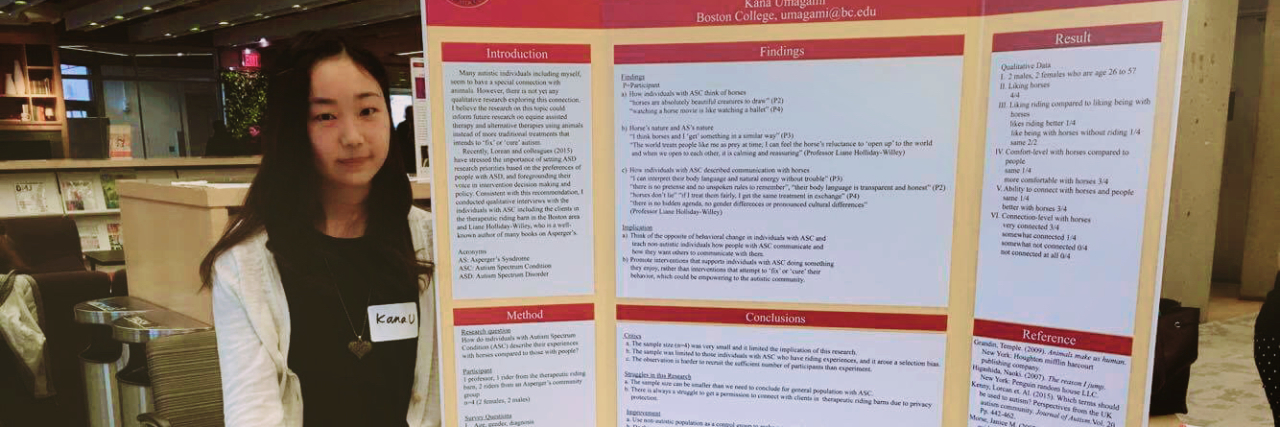My name is Kana. I’m 22 years old and recently completed a Master’s degree in Counseling Psychology. I am also autistic and this is the story of my life growing up with Asperger’s syndrome.
I have a passion, obsession and strong interest in Asperger’s, which comes from my recent diagnosis. The picture is from this April, when I presented my research on the chemistry between autistic individuals and horses at a conference at Harvard University. I did not know anything about Asperger’s until my mom told me about it when she happened to be in a lecture by a person with Asperger’s last year. Then I started to search and read everything I could find about it. The first book I read was “Aspergirl” by Rudy Simone, which described her life and other women’s lives she interviewed. The book was a little bit of a shock, as I thought it described me.
I never thought I was autistic, but I knew I was different from everyone else.
In Japan, the schools allowed us a lot of freedom within discipline. We did not use textbooks, and instead we worked on one college-level math problem in class from different perspectives or we did research on our interests and presented them in class for social studies. It allowed me to be myself in some ways, but I did not feel comfortable being in class due to sensory issues. Ballet, which I have been doing since I was 3, also hid my autism.
I managed to make friends in ballet because all we talked about was about ballet. So I knew what we were talking about, unless they did social chit-chat.
I started my college education in Japan in 2013, where I was born and grew up, however, I decided to leave the college after a year and a half of being there. I had huge anxiety walking around the campus to get to class or being in class. My fingers or toes felt numb when I saw many people around me. I was also depressed at that time, and eventually could not go to class anymore.
Though I did not see it as a disorder at the time, I lost 15 kilograms when I started college. Like many Aspies, I am strict with myself and a perfectionist, so I decided to lose some weight at first and it went beyond anyone’s control. I went to see a school counselor in college, I went to see therapists and psychiatrists, yet the solution they reached every time was I was severely depressed and was prescribed medicine. With the medication, I gained weight and my face looked swollen, so it made me feel bad about myself and my life again. At that time, I was thinking of studying abroad to make a fresh start because Japanese college did not seem to suit me.
In February 2015, I moved to Boston to go to college. While I was studying in the U.S. for almost 3 years and using counseling centers, I noticed that students were using the service much more than in Japan. When I saw a therapist in college in Japan, she was one of the only two therapists. I never saw other people coming in before or after my appointment, because they adjust the time so students coming to therapy do not have to see each other. But this is all about the college counseling experience; what about seeing a local therapist? You usually have to wait for a long time to see someone in Japan. From my experience, the waiting list has been six to 12 months long. I always gave up on it because I needed someone to see me when I asked for help, not six months later!
Many of my American friends told me that Japan was a clean country and very organized. And it is clean and organized, but sometimes I feel rules take over what really matters, such as mental health. In mental health, I believe promptness is important because clients are struggling now. It might be the same as some autism support in the U.S., as I was put on a 9-month-long waiting list when I first contacted an autism center for assessment, but I ended up getting a diagnosis in a local clinic much sooner.
It was good that the U.S. had many therapists and clinics I could go to, but in Japan, especially for an autism diagnosis, there are few clinics that specialize in it. I see this as a problem in Japan, as well as the stigma around autism and mental illness. Furthermore, we do not have active autism communities in Japan. Community is a very important part of support and its absence is not good.
I cannot do much by myself to change this, but because I am autistic and have experienced challenges living with it due to the lack of support and understanding, I now strongly think I want to be an advocate and researcher to bring better understanding of autism and to better support the community.
We want to hear your story. Become a Mighty contributor here.
Photo by contributor.

